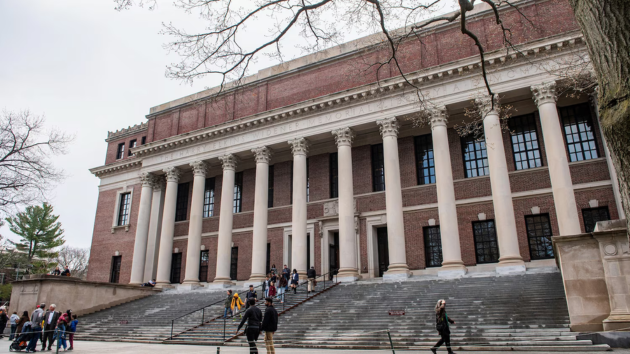
(CAMBRIDGE, Mass.) -- A temporary restraining order on President Donald Trump barring foreign Harvard University students from entering the U.S. will remain in effect until next Monday while a federal judge considers arguments made for a preliminary injunction.
The temporary block was due to expire on Thursday before being extended Monday by U.S. District Court Judge Allison Burroughs.
Harvard's lawyers argued Trump's proclamation violates its First Amendment rights and is outside the authority of the executive branch. Listing the actions taken by the government against Harvard in recent weeks, attorney Ian Gershengorn argued in a court hearing Monday in Boston that the move was retaliation and viewpoint discrimination against the institution.
Gershengorn argued the president is not restricting entry, but instead limiting what you do and who you associate with after you enter. The permissible way to classify a class of aliens is based on the character of the alien, he argued.
The government pushed back, arguing the administration does not "trust" Harvard and that it did not monitor the "aliens" that it brought into the U.S. The government said bringing in foreigners is a privilege not a right, according to Tiberius Davis, counsel to the assistant attorney general.
"We don't trust Harvard to vet, host, monitor or discipline" foreigners, Davis argued. Davis also raised concerns about Harvard's "foreign entanglements" with the Chinese government and said it did not provide sufficient information to the government on foreign students -- which Harvard has denied.
Harvard University filed the lawsuit against the government after U.S. Department of Homeland Security Secretary Kristi Noem announced it was canceling Harvard's Student and Exchange Visitor Program certification, which would bar the school from enrolling foreign students.
The suit was later amended to include the proclamation and Harvard moved to request a second block on Trump's proclamation. That would have gone into effect for at least six months before it was blocked by Burroughs.
The judge questioned arguments made by the government over its concerns about Harvard that motivated the proclamation.
"I can't imagine that anything that you just described applies only to Harvard," Burroughs said.
Davis argued the government is free to investigate other institutions and said that "a lot of these other universities are willing to" do more to address issues on campus.
Davis also argued that different government agencies chose to terminate grants with Harvard because they believed the institution was not following the law, saying that move was not retaliation either. Davis also said Harvard is not being singled out with grant terminations because other institutions have suffered the same.
The government argued it is not singling out Harvard, but rather other institutions have been more willing to take action to address issues on campus, while Harvard has not, Davis said.
"There's a lack of evidence of retaliation here," Davis said in court.
Burroughs said if the point is to root out antisemitism, "Why aren't we letting in people from Israel?"
Davis argued antisemitism was just one part of the issue, along with foreign entanglements and not providing sufficient information to the government. Because of their other conduct on campus and their inattentiveness to it "we don't trust them," Davis said.
"They don't have to pull over everybody who's speeding. Frankly they can't do that," Davis said.
Pushing back on arguments that it did not monitor its students, Harvard said it is the government's responsibility to vet students being allowed into the country.
"The vetting is done by the State Department in their visa process," Gershengorn said.
At one point in the Monday hearing, the judge asked Harvard's attorneys why it did not name the president in its lawsuit, asking if he needed to appear in this case.
Gershengorn said it sued the people who are tasked with implementing the proclamation.
Gershengorn argued Trump's usage of the proclamation to block entry of foreign Harvard students is a "vast new authority to regulate the domestic conduct of domestic institutions," a departure from how this proclamation has been used in the past. Gershengorn said it has been used to block the entry of individuals or nationals of a country that have "done something bad."
The question is not whether the action is lawful or not, Gershengorn argued. If lawful action is taken as a First Amendment-motivated action, it is no longer lawful, he added.
Gershengorn said what Harvard has suffered over the last two months is probably the most "irregular" and "improper" action any institution has suffered.
Harvard pushed back against claims there is widespread violence on campus, saying the story the government cites identified two incidents of violence on the basis of religion. The government is "throwing things at the wall to see what sticks," Gershengorn said.
Harvard has alleged that the administration is in an "escalating campaign of retaliation" against the school. After Harvard publicly refused to comply with demands made by the Trump administration, the administration responded by freezing more than $2.2 billion in grants and $60 million in contracts to the school.
In April, Harvard filed a separate lawsuit over the funding.
Copyright © 2025, ABC Audio. All rights reserved.

